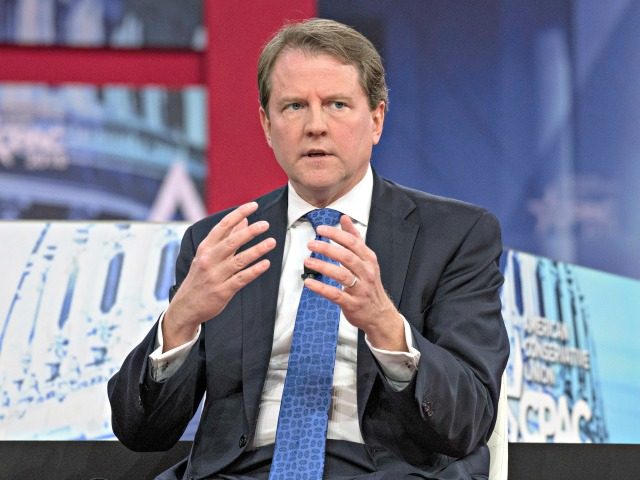NATIONAL HARBOR, MD – White House Counsel Don McGahn addressed conservatives at CPAC on Thursday, explaining how President Donald Trump selects nominees for the U.S. Supreme Court and the lower federal courts.
Hillsdale College President Larry Arnn introduced McGahn as President Trump’s “primary adviser” on judicial appointments. President Trump came into office with a exceptionally high number of judicial vacancies and retirement-age judges, providing a historic opportunity to reshape the federal judiciary.
McGahn started by noting that the president ran on the idea of appointing conservative judges. “What the president looks for are excellent credentials,” he began, referring to education and what they have accomplished in the legal profession.
But President Trump focuses on evidence of a particular character trait as well.
“What the president likes are folks who have demonstrated some sort of courage, some sort of ability to stand strong in the face of adversity,” McGahn explained. President Trump looks for evidence that “once they get on the bench, [they] will not change and become someone else,” such as being susceptible to pressure from editorial pages and public-opinion polls.
President Trump is committed to “the notion of the rule of law,” the top White House lawyer continued, referring to judges who would faithfully follow whatever the words of the law are, rather than be “inclined to create the law on their own.”
Otherwise put, President Trump wants judges who have “demonstrated the ability to stand strong, as he has his entire life.”
“It’s not a coincidence” that President Trump ultimately picked Neil Gorsuch for the Supreme Court, McGahn gave as an example, adding that “Justice Gorsuch is going to be a tremendous justice.”
McGahn explained that a major item that “stuck out in his record” as a judge on the U.S. Court of Appeals for the Tenth Circuit is that Gorsuch issued a broad-based opinion questioning Chevron deference. That is from the Chevron case, where the Supreme Court in 1984 held that when a regulatory statute is ambiguous or silent on a matter, courts should defer to any reasonable interpretation the federal government agency that administers the statute issues on the matter.
“Courts are increasingly deferential” to federal agencies, McGahn explained, despite the fact that Article I of the Constitution is explicit that “the legislative power is vested in the legislature.”
“Courts ought not defer to unelected agency heads,” McGahn argued, and praised Gorsuch for this lower-court decision where he “stuck his neck out on an issue.”
President Trump wants “a well-rounded, holistic person who understands the separation of powers” in the Constitution, he went on.
Gorsuch’s view of forcing Congress to reexamine laws instead of letting federal agencies interpret their own powers is “more consistent with the original text and meaning of the Constitution,” McGahn asserted, which is the bedrock of “the rule of the law and the constitutional order.”
Ken Klukowski is senior legal editor for Breitbart News. Follow him on Twitter @kenklukowski.

COMMENTS
Please let us know if you're having issues with commenting.